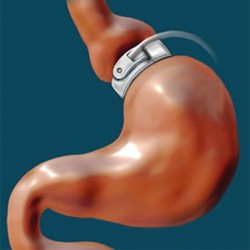By Helen Figueira
August 20, 2013
Time to read: 3 minutes
 Gastric banding versus gastric bypass
Gastric banding versus gastric bypass
Obesity is one of the leading global causes of preventable death. Once relegated to high-income countries, the pandemic is spreading in middle to low-income countries, particularly in urban areas. Psychiatric, psychological, hormonal and genetic factors affect eating behaviour. For those worst affected, weight reduction often requires surgery. Generally this involves gastric banding – the use of a water filled band to decrease stomach size, or Roux-en-Y gastric bypass (RYGB). The latter method re-routes the digestive system to bypass most of the stomach through to the small intestine. Tony Goldstone, a Senior Clinician Scientist in the Metabolic and Molecular Imaging Group at the CSC and Consultant Endocrinologist at Imperial College Healthcare NHS Trust, has recently shown that the consequences of gastric bypass surgery are quite different from the gastric band.
“We already knew that gastric bypass surgery was more effective than gastric banding to reduce weight,” explains Goldstone, “Now we find that after gastric bypass, patients display very different eating behaviour than after gastric banding”. Goldstone’s study used functional MRI, in which patients who had undergone either gastric banding or bypass surgery were shown images of food while their brain activity was measured. Food was either high-calorie e.g. cakes, chocolate and pizzas, or low-calorie e.g. fish, vegetables and salad. Gastric bypass patients showed less activation in the reward regions of the brain to high-calorie food than gastric band patients.
“Both surgical groups had reduced appetite,” adds Goldstone, “but bypass patients rated high-calorie foods including ice cream as less appealing.” And what’s more they consumed less fat overall than the gastric banding group. “Additionally bypass patients had higher levels of certain hormones and metabolites that reduce appetite compared to patients who had gastric banding or no operation.” The researchers postulate the higher levels of plasma GLP-1, PYY and bile acids observed may alter cravings for certain types of food. “After gastric bypass, people also reported more intestinal discomfort and nausea after eating high-calorie foods than patients after banding.”
“The evidence clearly shows that gastric bypass is more efficacious at reducing weight,” affirms Goldstone. “Our study provides a potential mechanism for this difference. Anatomical changes resulting from gastric bypass surgery alter the gut physiology. This in turn seems to impact on eating behaviour resulting in a shift away from high-calorie foods.” The study provides compelling new evidence to explain why gastric bypass is more effective than gastric banding.” But Goldstone hastens to add, “We are not ruling out gastric banding. It is quicker and cheaper than gastric bypass, and has fewer complications.” Although this study provides new insights into how obesity surgery works, choosing between surgical options will remain a decision between patients and doctors.
Goldstone’s research gives further weight to the arguments that the gut-brain axis is key not only to appetite regulation but even how we perceive food. The search for novel and simple interventions to change eating behaviour, which avoid the need for surgery, will no doubt add extra armoury to the ongoing challenges which obesity poses to the human population. Goldstone’s team is now keen to discover what particular aspects of gastric bypass surgery cause the brain to respond differently to food.
MT
Reference: Scholtz et al. 2013, Gut. Obese patients after gastric bypass surgery have lower brain-hedonic responses to food than after gastric banding. doi:10.1136/gutjnl-2013-305008